What is Healthcare Simulation Week?
Healthcare Simulation Week is an annual event that celebrates and promotes the use of simulation in healthcare education and training. This year's theme, "Launchpad to Legacy: What's Your Next?" is all about sharing your goals and collaborating with others to propel the field forward. Whether you're an individual aiming for certification, an organization seeking program accreditation, someone new to the healthcare simulation field and ready to grow, or someone ready to mentor the next wave of professionals in the field, Healthcare Simulation Week provides a platform to share your ambitions and learn from others.
Monday, September 16th
Danaiet Teame MN RN CHSE
Manager, Health Simulation Learning Center
Mount Royal University
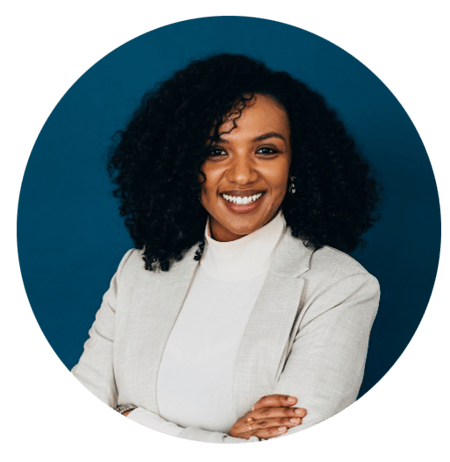
How do you stay updated with the latest advancements and best practices in simulation and technology and techniques?
"I am very fortunate to be in a PhD program that focuses on Healthcare Simulation at MGH IHP. I have access to the brilliant minds and leaders of simulation. I also attend conferences, create relationships with simulation communities, and be part of sim organizations such as Simulation Canada, INACSL, and SSH. Being the manager has allowed me to grow my operation skills and my knowledge regarding mannequins and technology. This is to say, deliberately making relationships and learning allows me to be current in simulation technology and techniques."
What advice would you give to individuals who are interested in pursuing a career in healthcare simulation?
"Do it! Healthcare simulation has many branches. I say, find an area you like and explore until you find your community and a place you belong. I find the simulation community very willing to support one another so reach out and connect with people. Send that email in your draft box, say hello to the person you have been reading their work at that conference, or like the LinkedIn post – make the connection to advance your dream!"
What inspired you to pursue a career in healthcare simulation?
"It was not intentional! I was a new faculty at University of Calgary in Qatar and found myself new to teaching and the types of students I was teaching. They were brilliant but had English as an additional language where their nursing care plans did not reflect their knowledge. I found the best way I could support them was by bringing them to the lab and doing live demonstrations, deliberate practice, direct feedback, and immersing them to clinical experiences in a place where we can reflect on/in action – little did I know, everything I was doing aligned with simulation as a teaching strategy. I then began to attend conferences and looked further into simulation in order to enhance my own capacity of being an effective educator. Since then, I can’t think of a better way to teach than simulation in its all forms."
What are your goals to further advance the field of healthcare simulation?
"I would like to further explore the use of simulation with other programs. Healthcare significantly benefits from this amazing strategy, but it can be applied across all programs. The opportunity for Sim-IPE also increases if simulation was a common approach across other programs."
What have been your "aha" moments that have reshaped the way you approach simulations?
"The danger of simulation! I believe all of us have made mistakes in simulation design and implementation. The mistakes I have made in my early sim days significantly impact my day to day work as the manager. Simulation is an amazing tool when used appropriately and can lead to significant harm if not used correctly."
About VALT at Mount Royal University
The Mount Royal University Health Simulation Learning Centre (HSLC) is an advanced health training facility delivering realistic scenarios for a range of students, educators and practitioners. Students in nursing, midwifery, social work, athletic therapy, medicine or other health-care fields use the HSLC for highly realistic training scenarios. VALT is used to observe and assess clinical simulation training and assessment sessions. Students and instructors can review sessions to pinpoint areas of improvement or reinforce strengths. Using video results in more precise assessments for instructors and specific actionable feedback for students.
Tuesday, September 17th
Colleen Steinhauser MSN, RN, Gero-BC, CHSE
Associate Professor of Nursing, Simulation Coordinator
Nebraska Methodist College
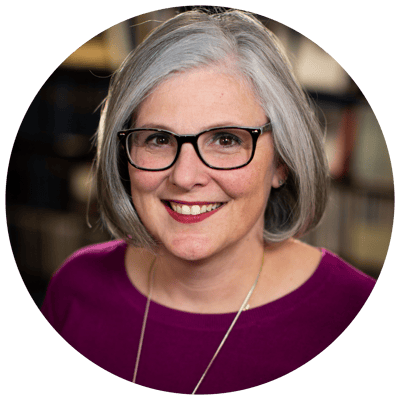
How do you stay updated with the latest advancements and best practices in simulation and technology and techniques?
"I am an active member in several simulation professional organizations. By attending national and international conferences and volunteering to serve as an abstract reviewer and research funding applications. In maintaining my Certified Healthcare Simulation Educator (CHSE), continuing education is a core piece. I am in the process of application to sit for the Certified Healthcare Simulation Operations Specialist (CHSOS) since my role covers both sides of simulation."
What inspired you to pursue a career in healthcare simulation?
"Simulation was always a part of my clinical course, then I was offered partial workload to assist with simulation across the curriculum because I understood the technical side of how the manikins worked decreasing tech calls, enjoyed the creative side of “making things look real,” and seeing the students’ progress with their skills in simulation across the curriculum. This academic year I am now the full time Simulation Coordinator where I work with the faculty to develop and run the simulations and coordinate the skills teaching and practice labs."
What are your goals to further advance the field of healthcare simulation?
"Continued involvement in National and International Simulation organizations. Developing research in students meaningful learning from simulation and skills practice."
What have been your "aha" moments that have reshaped the way you approach simulations?
"Promoting psychological safety within simulation is my “aha.” In my time, I have seen some simulations “go bad for students.” Seeing this stresses the need to support students in their learning by working with faculty to follow simulation best practice."
What advice would you give to individuals who are interested in pursuing a career in healthcare simulation?
"Join simulation groups on social media. When simulation centers needed to pivot to online with Covid-19 many new groups formed to share information and best practice. Need an idea to set up a simulation or best practice - someone may have one to share. Need an idea how to create a moulage or fix something - someone may have already done it. "
About VALT at Nebraska Methodist College
Nebraska Methodist College (NMC) is an accredited, private, not-for-profit nursing and healthcare college. NMC students experience a holistic culture of caring while mastering the art and science of healthcare. NMC uses VALT in their learning lab to observe and critique clinical scenarios. The learning centered laboratory design integrates classroom knowledge with practice and promotes application, comprehension, and analysis through the nursing process. The structured environment allows students to safely perform high risk skills and develop competencies before and during actual clinic experiences.
Wednesday, September 18th
Leora Wright
Simulation Operations Specialist
Auburn University College of Nursing
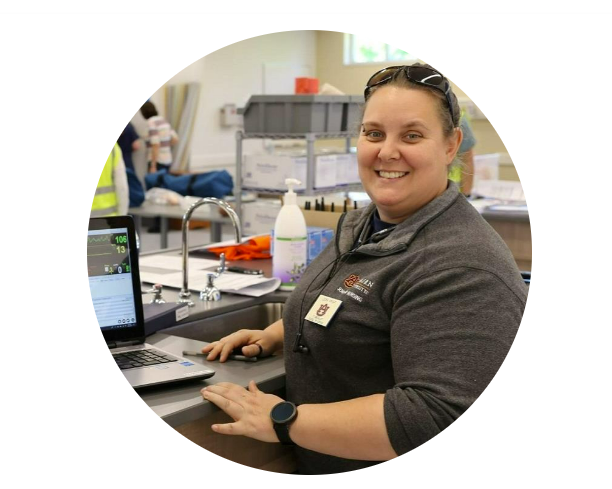
How do you stay updated with the latest advancements and best practices in simulation and technology and techniques?
"I have found that the people in the sim community are amazing. They love sharing their ideas and genuinely want to help others in the community better themselves. Being a part of SSH and SimGhost has really helped me to network with others in operations. There are also many Facebook groups full of amazing people willing to answer any question you could have from moulage to 3D printing. It is always awesome to see what others are doing, and it keeps me on my toes so I am doing all I can for my college."
What inspired you to pursue a career in healthcare simulation?
"My background is in Information Technology. I started at the College of Nursing 14 years ago as their main IT person and handled all technical support. Little did I know at that time that included the nursing simulation lab and manikins 😊 The more I worked with the simulation team, the more interested I became in simulation operations. I officially joined the AUCON Simulation Team in 2019 as their first Simulation Operations Specialist and have never looked back."
What are your goals to further advance the field of healthcare simulation?
"I have recently completed my Bachelor of Science in Healthcare Simulation with Carolinas College of Health and Science. This program has helped me elevate my knowledge and skills in not only simulation operations but also in education and administration. I plan to use all that I have learned to help in all areas of simulation, not just operations."
About VALT at Auburn University
The Auburn University College of Nursing Engaging Active Group Learning Environments in Simulation (EAGLES) Center uses simulation-based experiences to enhance health science education. Students engage in real-life scenarios where they provide care to simulated patients. By using innovative technologies and dynamic simulation-based experiences, students then develop and enhance clinical judgment and skills. Rooms at the EAGLES Center are outfitted with VALT that allows sessions to be recorded and reviewed by participants to reflect on their performance.
Thursday, September 19th
Kelly Foltz-Ramos, PhD, RN, FNP-BC, CHSE-A
Director of Simulation & Innovation, Assistant Professor
University at Buffalo School of Nursing
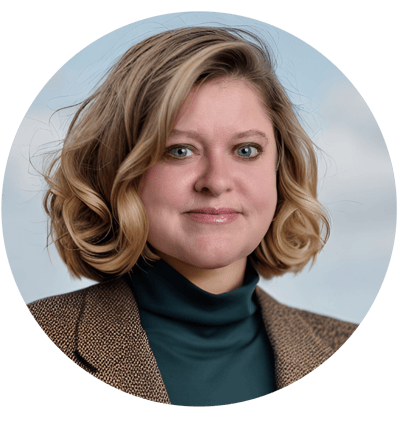
How do you stay updated with the latest advancements and best practices in simulation and technology and techniques?
"To stay updated with the latest advancements and best practices in simulation technology, I actively engage with professional organizations like the International Nursing Association for Clinical Simulation & Learning (INACSL), the Society for Simulation in Healthcare (SSH), and the Canadian Alliance for Nurse Educators Using Simulation (CAN-Sim). Membership in these organizations keeps me connected with the broader simulation community and provides access to valuable resources. I also attend conferences, which offer opportunities to learn from other educators and explore the latest simulation technologies from vendors. Additionally, I participate in webinars and read academic journals to stay informed about ongoing developments in the field.
When implementing new techniques or technologies in my lab, I conduct research and share my findings to contribute to the evolving body of best practices. Adhering to the INACSL Healthcare Simulation Standards of Best Practice, which are regularly updated, is essential for maintaining high standards in simulation education."
What inspired you to pursue a career in healthcare simulation?
"I always felt drawn to a career in education because I truly enjoyed my role as a preceptor, guiding new nurses and supporting their growth in the field. I have also always been a technology enthusiast, personally and professionally. Healthcare simulation brings these interests together—it merges my passion for teaching with my fascination for technological innovation. Through simulation, I can design engaging, hands-on learning experiences that equip healthcare professions students with practical skills for real-life situations and contribute to the advancement of healthcare education overall."
What are your goals to further advance the field of healthcare simulation?
"My goal is to advance healthcare simulation by developing innovative and immersive experiences that enhance learning outcomes for nursing students and healthcare professionals. This includes leveraging emerging technologies like virtual reality (VR) and augmented reality (AR) to create realistic training environments. I am also focused on promoting interprofessional collaboration by designing simulations that reflect the complexities of real-world clinical settings, which will help prepare students and practitioners for effective teamwork and communication. Additionally, I aim to contribute to the research in healthcare simulation by evaluating the effectiveness of various simulation techniques and technologies on clinical judgment and sharing these findings to improve best practices. I am committed to mentoring and supporting the next generation of simulation educators and leaders, fostering a culture of innovation and continuous improvement in healthcare simulation education."
What have been your "aha" moments that have reshaped the way you approach simulations?
"Throughout my years working in simulation, I've experienced many "aha" moments that have shaped my approach. One significant realization was the power of debriefing, which came to light while I was studying the impact of unexpected death on emotional affect, cognitive load, and knowledge gain. I discovered that a well-executed simulation could evoke genuine emotions, and when followed by effective debriefing, these emotions can be harnessed to create a profound learning experience. Reflection during debriefing allows learners to process their feelings and thoughts, leading to deeper understanding and retention of knowledge.
Another important "aha" moment is the value of allowing students to make decisions during simulations. Many students share that in clinical settings, they often observe or assist but rarely make decisions themselves. Simulation uniquely provides this opportunity for decision-making practice, enabling students to actively engage in critical thinking and develop their clinical judgment in a safe environment. This experience prepares them for real-world situations where they will need to make quick, informed decisions, enhancing their readiness and confidence as future healthcare professionals."
What advice would you give to individuals who are interested in pursuing a career in healthcare simulation?
"For individuals interested in pursuing a career in healthcare simulation, my advice is to immerse yourself in both the clinical and educational aspects of simulation. Start by gaining a strong foundation in clinical practice and understanding the real-world challenges that healthcare professionals face. This experience will help you design realistic and effective simulations that address key learning objectives. Additionally, develop a solid understanding of educational principles and learning theories to effectively create and deliver simulation-based education.
Networking is also crucial in this field. Join professional organizations such as the International Nursing Association for Clinical Simulation & Learning (INACSL) and the Society for Simulation in Healthcare (SSH) to connect with experts and stay current on best practices and emerging trends. Attend conferences, participate in webinars, and read academic journals to continually enhance your knowledge and skills. Finally, don't be afraid to experiment and innovate—simulation is a rapidly evolving field, and there is always room for new ideas and approaches to improve the learning experience for students and healthcare professionals."
About VALT at University at Buffalo
At the University at Buffalo (UB) School of Nursing, simulation technology is changing the way students are being prepared to face real-world scenarios in the field of nursing. The UB School of Nursing aims to achieve the highest level of fidelity in its simulations, meaning the simulations are as true to life as possible. They provide stimulating hands-on experiences to nurture students' knowledge and confidence, while sharpening their professional skills. The UB School of Nursing uses VALT to stream and record scenarios. This allows students to observe patient scenarios and debrief afterwards.
Friday, September 20th
Jesica Naiman, PhD(c), RN, COI
Simulation Coordinator, School of Health Sciences
St. Edward's University
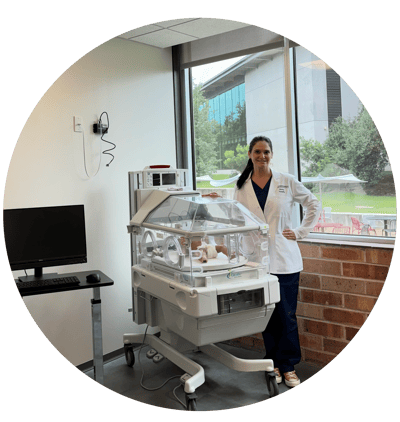
How do you stay updated with the latest advancements and best practices in simulation and technology and techniques?
"Through my association with professional organizations, such as the International Nursing Association for Clinical Learning and Simulation (INACL), I stay current on the technology available for simulation. I also collect data from pre- and post-briefings to evaluate learning outcome measures during simulation. The information gained helps to shape future simulations. Lastly, I participate in a collaborative workgroup with simulation coordinators in our area to share resources and ideas."
What inspired you to pursue a career in healthcare simulation?
"After about a decade of nursing practice, I wanted to help other nurses develop their practice skills, so I returned to school to become a nurse educator. I immediately started using the lab as an educational resource. The simulation lab is a safe place for students to practice their reactions to different situations and perfect their responses in life-saving situations. I found students would spend hours practicing before clinical, then walk into a clinical setting ready to respond. Healthcare simulation is an integral part of my teaching practice. I want to make those benefits accessible and easy to integrate across our curriculum."
What are your goals to further advance the field of healthcare simulation?
"Simulation is essential in developing the skills necessary for nursing and other health professions. I would like to see more intuitive mannequin responses to stimuli as AI technology develops."
What have been your "aha" moments that have reshaped the way you approach simulations?
"That is a great question! During my first year as an educator, I developed a very basic scenario for my students. The basic scenario I spent 20 minutes writing led to a two-hour debriefing where students felt comfortable seeking direction and clarification. Seeing first-hand how students opened up in this safe space for learning was my "aha moment." From that point on, I integrated simulation into every course I taught."
What advice would you give to individuals who are interested in pursuing a career in healthcare simulation?
"I recommend collaborating with other simulation lab experts across healthcare disciplines to learn and gain inspiration. Don't rely on the simulation equipment vendor to teach you everything you need to know. Joining a simulation association provides non-biased resources not associated with selling a product."
About VALT at St. Edward's University
St. Edward's University Simulation Learning and Resource Center is a state-of-the-art simulation and learning environment where students participate in didactic, lab and clinical learning activities. Students and faculty engage in hands-on education and simulated learning experiences critical for the healthcare field. VALT enhances those learning experience by allowing instructors and students to easily record and review lab sessions. The Center provides an immersive environment where students can develop and refine their clinical skills before entering real-world practice.
Download the Healthcare Simulation Planning Guide
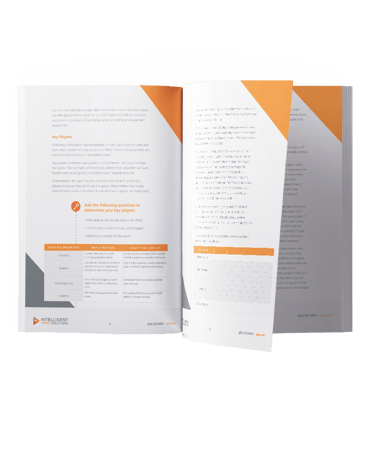
If you’re considering an expansion, renovation, or new simulation space, use this guide to brainstorm. It includes topics and tools to use in your early planning stages including key players, funding, and equipment evaluation.


